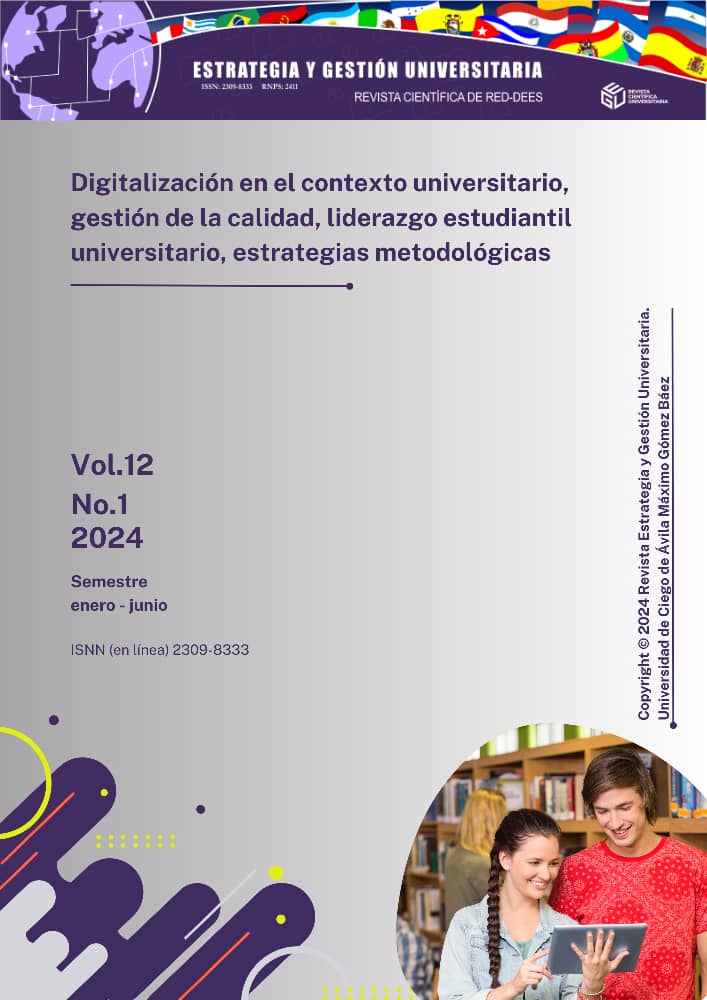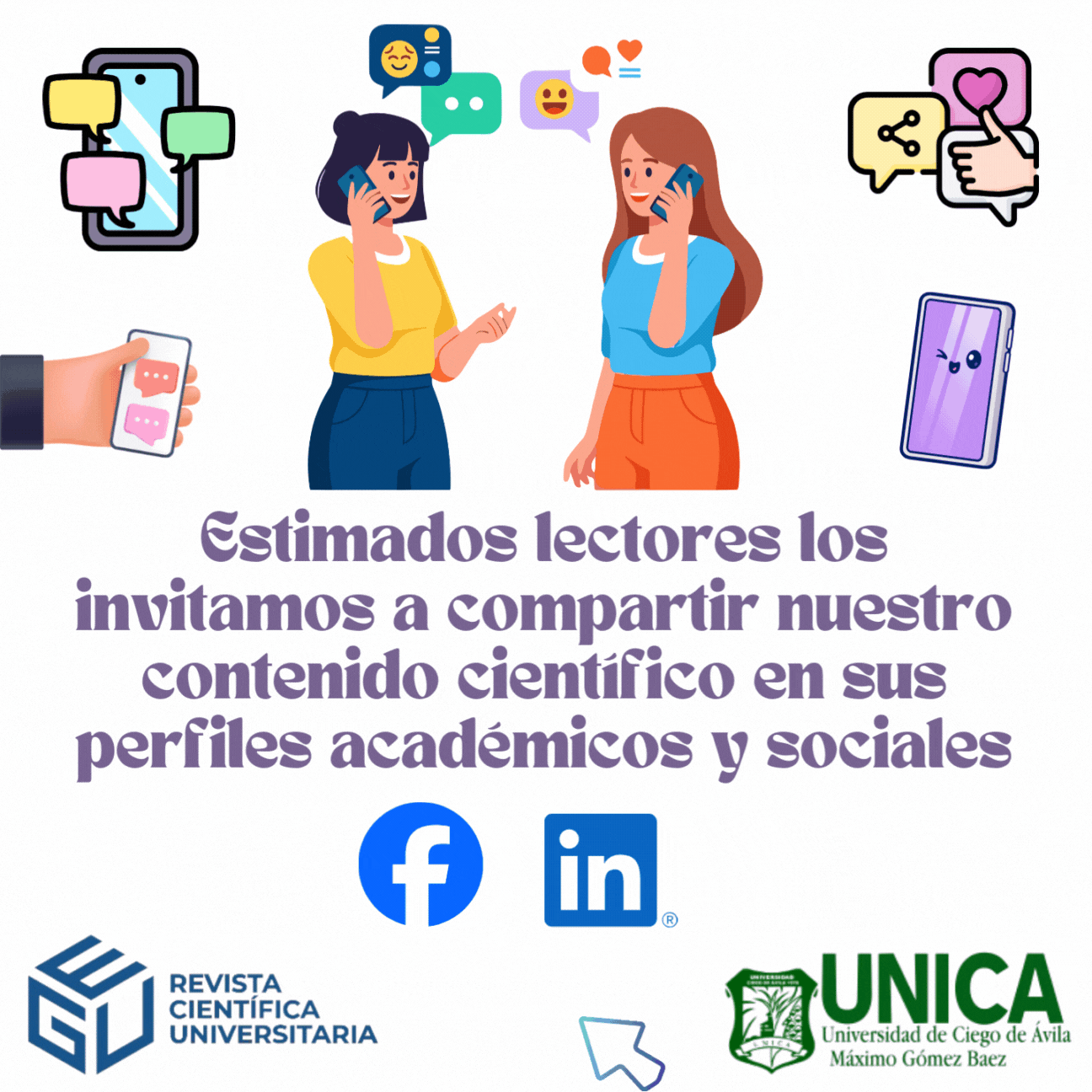Uma abordagem à gestão do cyberbullying no contexto universitário
DOI:
https://doi.org/10.5281/zenodo.11123837%20Palavras-chave:
gestão, universidade, cyberbullyingResumo
Introdução: atualmente, o cyberbullying é considerado um dos temas mais preocupantes que ocorre em diversos contextos educacionais. Objetivo: revelar tendências na gestão do enfrentamento ao cyberbullying no contexto universitário. Método: abordagem qualitativa com desenho de teoria fundamentada em sua variante emergente, amostragem teórica orientou a seleção dos participantes (n=20) e foi utilizado o critério de representatividade para amostras qualitativas. O enfrentamento ao cyberbullying no contexto universitário foi definido como unidade de análise e a entrevista semiestruturada foi aplicada a gestores, especialistas do departamento de assistência social e líderes estudantis em processos de gestão universitária, com base em temas identificados a priori na análise de. literatura científica publicada. O tratamento das informações foi realizado por meio de análise de conteúdo. Resultados: o estudo revelou três códigos fundamentais: impacto psicológico e emocional, desempenho e participação escolar, e relações sociais e isolamento. O cyberbullying foi abordado como um fenômeno nocivo que pode causar danos significativos aos estudantes universitários, tanto no âmbito pessoal quanto acadêmico. Conclusão: a gestão universitária deve focar suas estratégias na prevenção do problema, para garantir a qualidade de vida dos estudantes e futuros profissionais.
Downloads
Referências
Abaido, G. M. (2020). Cyberbullying on social media platforms among university students in the United Arab Emirates. International Journal of Adolescence and Youth, 25(1), 407–420. https://doi.org/10.1080/02673843.2019.1669059
Achuthan, K., Kumar, V., Kowalski, R., Ramanathan, S., & Raman, R. (2023). Cyberbullying research-Alignment to sustainable development and impact of COVID-19: Bibliometrics and science mapping analysis. Computers in Human Behavior, 140, 107566. https://doi.org/10.1016/j.chb.2022.107566
Ademiluyi, A., Li, C., & Park, A. (2022). Implications and Preventions of Cyberbullying and Social Exclusion in Social Media: Systematic Review. JMIR Formative Research, 6(1), e30286. https://doi.org/10.2196/30289
Akcan, G., & Öztürk, E. (2020). The investigation of predictors of Cyberbullying and cyber victimization in university students. Turkiye Klinikleri Journal of Forensic Medicine and Forensic Sciences, 7(1), 47-57. https://doi.org/10.5336/forensic.2019-71934
António, R., Guerra, R., & Moleiro, C. (2023). Cyberbullying during COVID-19 lockdowns: prevalence, predictors, and outcomes for youth. Current Psychology. https://doi.org/10.1007/s12144-023-04394-7
Balakrisnan, V., & Kaity, M. (2023). Cyberbullying detection and machine learning: a systematic literature review. Artificial Intelligence Review, 56(1), 1375-1416. https://doi.org/10.1007/s10462-023-10553-w
Cao, X., Khan, A.N., Ali, A., & Khan, N. A. (2022). Consequences of Cyberbullying and Social Overload while Using SNSs: A Study of Users’ Discontinuous Usage Behavior in SNSs. Information Systems Frontiers Aims and Scope, 22, 1343–1356. https://doi.org/10.1007/s10796-019-09936-8
Cardeño Portela, N., Cardeño Portela, E., & Bonilla Blanchar, E. (2023). TIC y transformación académica en las universidades. Región Científica, 2(2), 202370. https://doi.org/10.58763/rc202370
Chan, T., Cheung, C. M. K. & Lee, Z. W. Y. (2021). Cyberbullying on social networking sites: A literature review and future research directions. Information & Management, 58(2), 103411. https://doi.org/10.1016/j.im.2020.103411
Chaves Cano, A. M., Sánchez Castillo, V., Pérez Gamboa, A. J., Castillo-Gonzalez, W., Vitón-Castillo, A. A., & Gonzalez-Argote, J. (2024). Internet of Things and Health: A literature review based on Mixed Method. EAI Endorsed Transactions on Internet of Things, 10, 1-10. https://doi.org/10.4108/eetiot.4909
Chun, J., Lee, J., Kim, J., & Lee, S. (2020). An international systematic review of cyberbullying measurements. Computers in Human Behavior, 113, 106485. https://doi.org/10.1016/j.chb.2020.106485
Cretu, D. M., & Morandau, F. (2022). Bullying and cyberbullying: a bibliometric analysis of three decades of research in education. Educational Review. https://doi.org/10.1080/00131911.2022.2034749
Curo Aliaga, G., & Pilloca Moyna, R. (2023). Calidad del Servicio Educativo y la Satisfacción del Estudiante de la I.E.P. Rosa de la Merced. Región Científica, 2(2), 2023107. https://doi.org/10.58763/rc2023107
Forssell, R. C. (2020). Cyberbullying in a boundary blurred working life: Distortion of the private and professional face on social media. Qualitative Research in Organizations and Management, 15(2), 89-107. https://doi.org/10.1108/QROM-05-2018-1636
Glaser, B. (2002). The Grounded Theory Perspective II: Description’s remodelling of Grounded Theory Methodoly. Mill Valley, C. A. Sociology Press.
Gómez Cano, C. A. (2022). Ingreso, permanencia y estrategias para el fomento de los Semilleros de Investigación en una IES de Colombia. Región Científica, 1(1), 20226. https://doi.org/10.58763/rc20226e
Gómez Cano, C. A., & Sánchez Castillo, V. (2022). Unveiling the Thematic Landscape of Cultural Studies Through Bibliometrics Analysis, 2(34), 1-7. https://doi.org/10.56294/cid202234
Gómez Cano, C. A., & Sánchez Castillo, V. (2023). Estrategias para el fortalecimiento del Programa de Administración en la Universidad de la Amazonia. Estrategia y Gestión Universitaria, 11(2), 33-52. https://doi.org/10.5281/zenodo.8145076
Helfrich, E., Doty, J., Su, Y., & Yourell, J. (2020). Parental views on preventing and minimizing negative effects of cyberbullying. Children and Youth Services Review, 118, 105377. https://doi.org/10.1016/j.childyouth.2020.105377
Hernández-Sampieri, R., & Mendoza Torres, C. (2018). Metodología de la Investigación: Las rutas cuantitativas, cualitativas y mixtas (7ma ed.): McGraw-Hill Interamericana.
Ifon, J. C. (2023). Management of Cyberbullying: A Qualitative Exploratory Case Study of a Nigerian University. International Journal of Bullying Prevention, 5, 161-77. https://doi.org/10.1007/s42380-022-00124-y
Ireland, L., Hawdon, J., Huang, B., & Peguero, A. (2020). Preconditions for guardianship interventions in cyberbullying: Incident interpretation, collective and automated efficacy, and relative popularity of bullies. Computers in Human Behavior, 113, 106506. https://doi.org/10.1016/j.chb.2020.106506
Jiménez-Pitre, I., Molina-Bolívar, G., & Gámez Pitre, R. (2023). Visión sistémica del contexto educativo tecnológico en Latinoamérica. Región Científica, 2(1), 202358. https://doi.org/10.58763/rc202358
Kintonova, A., Vasyaev, A., & Shestak, V. (2021). Cyberbullying and cyber-mobbing in developing countries. Information & Computer Security, 29(3), 435–456. https://doi.org/10.1108/ICS-02-2020-0031
Lan, M., Law, N., & Pan, Q. (2022). Effectiveness of anti-cyberbullying educational programs: A socio-ecologically grounded systematic review and meta-analysis. Computers in Human Behavior, 130, 107200. https://doi.org/10.1016/j.chb.2022.107200
Lincon, Y., & Guba, E. (1985). Naturalistic Inquiry. Sage.
Llorent, V. J., Farrington, D. P., & Zych, I. (2021). School climate policy and its relations with social and emotional competencies, bullying and cyberbullying in secondary education. Revista de Psicodidáctica (English Ed.), 26(1), 35–44. https://doi.org/10.1016/j.psicoe.2020.11.002
López González, Y. (2023). Aptitud digital del profesorado frente a las competencias TIC en el siglo XXI: una evaluación de su desarrollo. Región Científica, 2(2), 2023119. https://doi.org/10.58763/rc2023119
López-Meneses, E., Vázquez-Cano, E., González-Zamar, M. D., & Abad-Segura, E. (2020). Socioeconomic Effects in Cyberbullying: Global Research Trends in the Educational Context. International Journal of Environmental Research and Public Health, 17, 4369. https://doi.org/10.3390/ijerph17124369
Martínez Rodríguez, L., Hernández Delgado, M., & Rodríguez González, D. R. (2022). Necesidades en cuidadores principales de pacientes hemodializados: un estudio de teoría fundamentada. Revista Conrado, 18(89), 54-64. https://conrado.ucf.edu.cu/index.php/conrado/article/view/2705
Monzón Pinglo, L. A., Dávila Cisneros, J. D, Rodríguez Torres, E. y Pérez Gamboa, A. J. (2023). La resiliencia en el contexto universitario, un estudio mixto exploratorio. Pensamiento Americano, 16(31), 1-15. https://doi.org/10.21803/penamer.16.31.636
Noroña González, Y., Colala Troya, A., & Peñate Hernández, J. (2023). La orientación para la proyección individual y social en la educación de jóvenes y adultos: un estudio mixto sobre los proyectos de vida. Región Científica, 2(2), 202389. https://doi.org/10.58763/rc202389
Ogolla, E., Kwanya, T., Kibe, L., Kogos, A., & Onsare, C. (2023). Curbing Cyberbullying on Facebook: An Analysis of Mitigation Strategies in Universities in Kenya. Information Impact. Journal of Information and Knowledge Management, 14(1), 1-21. https://dx.doi.org/10.4314/iijikm.v14i1.1
Pérez Gamboa, A. J., Echerri Garcés, D. y García Acevedo, Y. (2021). Proyecto de vida como categoría de la pedagogía de la Educación Superior: aproximaciones a una teoría fundamentada. Transformación, 17(3), 542-563. http://scielo.sld.cu/scielo.php?pid=S2077-29552021000300542&script=sci_abstract
Pérez Valdivia, Y. O., Rojas Sánchez, G. A., Sánchez Castillo, V., & Pérez Gamboa, A. J. (2024). The psychological well-being category and its importance in healthcare practice: A semi-systematic review. Revista Información Científica, 103, e4478. https://doi.org/10.5281/ZENODO.10615337
Piccoli, V., Carnaghi, A., Grassi, M., Stragà, M., & Bianchi, M. (2020). Cyberbullying through the lens of social influence: Predicting cyberbullying perpetration from perceived peer-norm, cyberspace regulations and ingroup processes. Computers in Human Behavior, 102, 260–273. https://doi.org/10.1016/j.chb.2019.09.001
Ramírez Moncada, J., Rodríguez Torres, E. y Zamora Reyes, J. (2023). Estrategias recreativas para suplir las carencias de niños y jóvenes en situaciones de la Covid-19 en el municipio Morón (Cuba). Región Científica, 2(1), 202328. https://doi.org/10.58763/rc202328
Ripoll Rivaldo, M. (2023). El emprendimiento social universitario como estrategia de desarrollo en personas, comunidades y territorios. Región Científica, 2(2), 202379. https://doi.org/10.58763/rc202379
Rodríguez Torres, E., Dávila Cisneros, J., & Gómez Cano, C. (2024). La formación para la configuración de proyectos de vida: una experiencia mediante situaciones de enseñanza-aprendizaje. Varona, (79), e2391. http://scielo.sld.cu/scielo.php?pid=S1992-82382024000100007&script=sci_abstract&tlng=es
Roman-Acosta, D., & Barón Velandia, B. (2023). Del conocimiento individual a la sinergia colectiva: potenciando la colaboración en las redes de investigación. Estrategia y Gestión Universitaria, 11 (2), 221-251. https://doi.org/10.5281/zenodo.10085278
Russo, D., & Parodi, M. (2021). The Protection of Children against Cybercrimes and Cyberbullying: International and European Obligations to Criminalize and the Uncertain Prospects of their Implementation in the Italian Legal System. International Criminal Law Review, 21(4), 767–783. https://doi.org/10.1163/15718123-bja10062
Ryoo, Y., & Kim, W. (2024). Approach versus Avoidance: A Self-Regulatory Perspective on Hypocrisy Induction in Anti-Cyberbullying CSR Campaigns. Journal of Business Ethics, 189, 345–364. https://doi.org/10.1007/s10551-023-05369-1
Saif, A. N. M., & Purbasha, A. E. (2023). Cyberbullying among youth in developing countries: A qualitative systematic review with bibliometric analysis. Children and Youth Services Review, 146, 106831. https://doi.org/10.1016/j.childyouth.2023.106831
Saleem, S., Farooq, N., Zafar, S., & Raza, N. (2022). Systematic literature reviews in cyberbullying/cyber harassment: A tertiary study. Technology in Society, 70, 102055. https://doi.org/10.1016/j.techsoc.2022.102055
Sánchez Suárez, Y., Pérez Gamboa, A. J., Hernández Nariño, A., Díaz-Chieng, L. Y., Marqués León, M., Pancorbo Sandoval, J. A., & Rodríguez Torres, E. (2023). Hospital culture and social responsibility: a mixed study of the main lines for its development. Salud, Ciencia Y Tecnología - Serie De Conferencias, 2, 451. https://doi.org/10.56294/sctconf2023451
Tetteh, A., Awaah, F., & Addo, D. (2023). Perception of cyberbullying among students: the study of a developing country. Journal of Aggression, Conflict and Peace Research, 15(2), 163-180. https://doi.org/10.1108/JACPR-06-2022-0726
Upadhyay, U., Kumar, A., Sharma, G., Gupta, B. B., Alhalabi, W., Arya, V., & Chui, K. (2023). Cyberbullying in the Metaverse: A Prescriptive Perception on Global Information Systems for User Protection. Journal of Global Information Management, 31(1), 1-25. https://doi.org/10.4018/JGIM.325793
Valladolid Benavides, A., Neyra Cornejo, F., Hernández Hernández, O., Callupe Cueva, P., & Akintui Antich, J. (2023). Adicción a redes sociales en estudiantes de una universidad nacional de Junín (Perú). Región Científica, 2(1), 202353. https://doi.org/10.58763/rc202353
Velasquez Castro, L., & Paredes Águila, J. (2024). Revisión sistemática sobre los desafíos que enfrenta el desarrollo e integración de las tecnologías digitales en el contexto escolar chileno, desde la docencia. Región Científica, 3(1), 2024226. https://doi.org/10.58763/rc2024226
Vismara, N., Girone, N., Conti, D., Nicolini, G., & Dell’’Osso, B. (2022). The current status of Cyberbullying research: a short review of the literature. Current Opinion in Behavioral Sciences, 46, 101152. https://doi.org/10.1016/j.cobeha.2022.101152
Xu, X., Yang, C., Huebner, E. S., & Tian, L. (2023). Understanding general and specific associations between cyberbullying and psychopathological symptoms in adolescents: a latent dimensional approach. European Child and Adolesent Psychiatry. https://doi.org/10.1007/s00787-023-02198-5
Xu, Y., & Trzaskawka, P. (2021). Towards Descriptive Adequacy of Cyberbullying: Interdisciplinary Studies on Features, Cases and Legislative Concerns of Cyberbullying. International Journal for the Semiotics of Law - Revue Internationale de Sémiotique Juridique, 34(4), 929–943. https://doi.org/10.1007/s11196-021-09856-4
Yokotani, K., & Takano, M. (2021). Social contagion of cyberbullying via online perpetrator and victim networks. Computers in Human Behavior, 119, 106719. https://doi.org/10.1016/j.chb.2021.106719
Yosep, I., Hikmat, R., & Mardhiyah, A. (2023). Preventing Cyberbullying and Reducing Its Negative Impact on Students Using E-Parenting: A Scoping Review. Sustainability, 15(3), 1752. https://doi.org/10.3390/su15031752
Downloads
Publicado
Como Citar
Edição
Seção
Licença
Copyright (c) 2024 Estrategia y Gestión Universitaria

Este trabalho está licenciado sob uma licença Creative Commons Attribution-NonCommercial-ShareAlike 4.0 International License.























